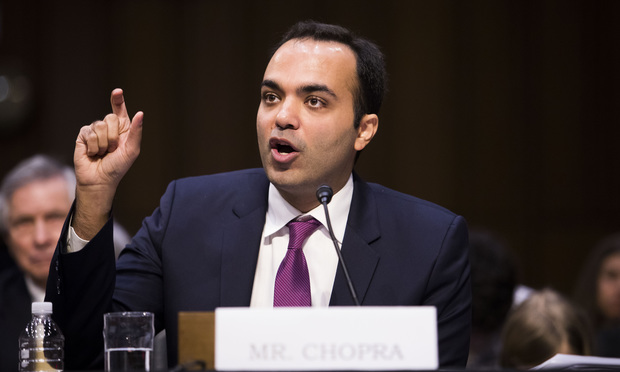FTC Commissioner's Social Media Statement Is a Heads-Up to Advertisers, Influencers
Federal Trade Commissioner Rohit Chopra's statement last week that the FTC had voted to launch a "close and careful review" of the FTC's non-binding endorsement guides and a "self-critical analysis" of its enforcement approach may signal an impending crackdown on social media influencers, advertisers and even their tech platforms, lawyers say.
February 21, 2020 at 07:18 PM
8 minute read
 Rohit Chopra. Photo: Diego M. Radzinschi/ALM
Rohit Chopra. Photo: Diego M. Radzinschi/ALM
Federal Trade Commissioner Rohit Chopra's statement earlier this month that the FTC had voted to launch a "close and careful review" of its non-binding endorsement guides and a "self-critical analysis" of its enforcement approach may signal an impending crackdown on social media influencers, advertisers and even their tech platforms, lawyers say.
"The FTC just voted to launch a review of our endorsement policies, which cover influencer marketing, fake reviews, and more," Chopra announced on Twitter. "We may need new rules for tech platforms and for companies that pay influencers to promote products. The review and your input will help us decide."
 Jim Dudukovich, Barnes & Thornburg.
Jim Dudukovich, Barnes & Thornburg.Barnes & Thornburg's Jim Dudukovich, who is of counsel in Atlanta, said, "The commissioner is signaling his desire for a sea change in enforcement and every stakeholder needs to be thinking about this." Dudukovich joined the firm after serving as associate general counsel with Chobani LLC in New York. Earlier, he was marketing and product counsel with food delivery retailer Blue Apron LLC in New York. He also spent 18 years in-house at The Coca-Cola Co. in Atlanta, according to his website bio.
Tamara Carmichael, an advertising and marketing partner at Olshan Frome Wolosky in New York, said: "From a perspective of brand owners and influencers and talent we work with in this space, it is clear that the FTC has been interested in social media and influencer marketing for some time, but the statements issued this month may have taken it up a notch." She said, "Legal and marketing in particular but also C-suite executives should have this issue on their radar."
Online product testimonials and reviews by celebrities and seemingly ordinary consumers who actually are paid shills for the products they tout have exploded in recent years on Instagram, YouTube and other social media platforms. Companies spent $8 billion on advertising through influencers last year, but that figure is projected to nearly double to $15 billion by 2022, according to a Business Insider Intelligence estimate based on Mediakix data.
In the statement issued Feb. 12, Chopra said: "Misinformation is plaguing the digital economy, and recent no-money, no-fault FTC settlements with well-known retailers and brands to address fake reviews and undisclosed influencer endorsements may be doing little to deter deception."
The FTC will need to determine whether to create new requirements for social media platforms and advertisers and whether to activate civil penalty liability, Chopra said. He also said he hoped the commission, after hearing public comments, would consider taking steps "beyond the issuance of voluntary guidance" for platforms such as Instagram, YouTube and TikTok that facilitate and directly or indirectly profit from influencer marketing. The public comment notice was published Friday on the Federal Register, an FTC spokesman said. Chopra declined a requested interview.
In his statement, Chopra called on the FTC to codify elements of its existing endorsement guides into formal rules, so that violators can be liable for civil penalties and damages, and to specify the requirements companies must meet in contracts with influencers.
 Renée Appel, with Seyfarth Shaw.
Renée Appel, with Seyfarth Shaw.Renee Appel, cosmetic and personal care products/advertising and marketing associate in the commercial litigation group at Seyfarth Shaw in Washington, D.C., said the statement by Chopra suggests disappointment in the efficacy of prior efforts and enforcement activity—which included the agency's sending out over 90 letters to influencers and marketers reminding them of their disclosure obligations and publishing pamphlets and videos. He "wants to now focus on technology platforms (e.g. Instagram, YouTube, and TikTok), which stand to directly or indirectly profit from influencer marketing," she said in an email.
Appel said in an interview that Chopra "is trying to highlight the platforms, too, who are either collecting data or getting compensation from the use of their platform."
Some recent examples of FTC actions against companies for fake or misleading reviews or testimonials include:
- A February 2019 consent order with Cure Encapsulations Inc., a company that bought fake Amazon.com reviews to boost its product ratings for dietary supplements.
- An April 2019 consent order with UrthBox, for giving free products to consumers who posted positive reviews online without disclosing that reviewers being compensated.
- And an October 2019 court order against Devumi LLC and its owner CEO German Calas Jr. in the Southern District of Florida on charges the company unlawfully sold fake social media indicators including fake followers, likes, subscribers and page views to actors and businesses. It was the FTC's first-ever complaint about fake indicators of social media influence. The order included an injunction and monetary judgment of $2.5 million, which was the amount the company was allegedly paid under the scheme, but after the defendant paid $250,000 the rest was suspended because of his representations about his financial condition. The defendants didn't admit or deny the allegations.
Also in October 2019, the FTC obtained a consent order from the eponymous Sunday Riley Modern Skincare company and its founder and CEO for posting fake reviews by the owner and her employees promoting the brand. They did not admit or deny the allegations.
Commissioners Chopra and Rebecca Kelly Slaughter issued a dissent in that case expressing frustration that the settlement didn't include financial penalties, which they argued would not deter similar conduct and sent the wrong message to the marketplace.
Appel said the FTC's activity is similar to efforts of the Food and Drug Administration that recently issued a notice of a proposed study that would extend research into disclosure of payments in direct-to-consumer drug promotions by celebrities, physicians, patients and influencers, signaling that with increased use of endorsers by advertisers, more regulations are likely to follow. In 2015, for example, the FDA warned a drug manufacturer about touting a morning sickness medication through an Instagram post by celebrity Kim Kardashian. The agency said the ad was false and misleading because it failed to disclose the risks. The Securities and Exchange Commission also has investigated celebrity endorsements of initial coin offerings in cryptocurrency recently.
Carmichael said in-house counsel for companies and influencers need clear guidance from the FTC that is in step with the rapid development in social media advertising and marketing:
"Brands, advertisers and influencers alike seek detailed and relevant guidance from the FTC on this issue in a way that keeps up with the social media and influencer phenomenon as current in the marketplace. The request for public comment is welcomed as it may result in more clarity and consistency with respect to guidelines to be followed. If the FTC entertains the idea of civil penalties, brands, advertisers and influencers will need clear guidance on how to comply with guidelines and avoid such penalties, and how the penalties are calculated," she said.
Dudukovich, who has co-authored industry guidelines on social media marketing and native advertising, and developed social media training for clients, said, "This could be a turning point toward heftier punishment."
He said, "The days that everyone else is doing it, so it must be OK, are over. I think the FTC has sent a strong shot across the bow that you had better not get comfortable with that. It's time to look at your social media policy and make sure every party understands the responsibilities and complies with them."
This content has been archived. It is available through our partners, LexisNexis® and Bloomberg Law.
To view this content, please continue to their sites.
Not a Lexis Subscriber?
Subscribe Now
Not a Bloomberg Law Subscriber?
Subscribe Now
NOT FOR REPRINT
© 2025 ALM Global, LLC, All Rights Reserved. Request academic re-use from www.copyright.com. All other uses, submit a request to [email protected]. For more information visit Asset & Logo Licensing.
You Might Like
View All
Here Are Some Answers to Employers' Many Legal Questions About the Coronavirus
8 minute read
Report: 97% of General Counsel Think a Recession Could Be Near, but Few Say They're Prepared
3 minute read
Tesla, CBS and United See New General Counsel: February 2019 In-House Moves
12 minute read
Law Firms Mentioned
Trending Stories
- 1Reviewing Judge Merchan's Unconditional Discharge
- 2With New Civil Jury Selection Rule, Litigants Should Carefully Weigh Waiver Risks
- 3Young Lawyers Become Old(er) Lawyers
- 4Caught In the In Between: A Legal Roadmap for the Sandwich Generation
- 5Top 10 Developments, Lessons, and Reminders of 2024
Who Got The Work
J. Brugh Lower of Gibbons has entered an appearance for industrial equipment supplier Devco Corporation in a pending trademark infringement lawsuit. The suit, accusing the defendant of selling knock-off Graco products, was filed Dec. 18 in New Jersey District Court by Rivkin Radler on behalf of Graco Inc. and Graco Minnesota. The case, assigned to U.S. District Judge Zahid N. Quraishi, is 3:24-cv-11294, Graco Inc. et al v. Devco Corporation.
Who Got The Work
Rebecca Maller-Stein and Kent A. Yalowitz of Arnold & Porter Kaye Scholer have entered their appearances for Hanaco Venture Capital and its executives, Lior Prosor and David Frankel, in a pending securities lawsuit. The action, filed on Dec. 24 in New York Southern District Court by Zell, Aron & Co. on behalf of Goldeneye Advisors, accuses the defendants of negligently and fraudulently managing the plaintiff's $1 million investment. The case, assigned to U.S. District Judge Vernon S. Broderick, is 1:24-cv-09918, Goldeneye Advisors, LLC v. Hanaco Venture Capital, Ltd. et al.
Who Got The Work
Attorneys from A&O Shearman has stepped in as defense counsel for Toronto-Dominion Bank and other defendants in a pending securities class action. The suit, filed Dec. 11 in New York Southern District Court by Bleichmar Fonti & Auld, accuses the defendants of concealing the bank's 'pervasive' deficiencies in regards to its compliance with the Bank Secrecy Act and the quality of its anti-money laundering controls. The case, assigned to U.S. District Judge Arun Subramanian, is 1:24-cv-09445, Gonzalez v. The Toronto-Dominion Bank et al.
Who Got The Work
Crown Castle International, a Pennsylvania company providing shared communications infrastructure, has turned to Luke D. Wolf of Gordon Rees Scully Mansukhani to fend off a pending breach-of-contract lawsuit. The court action, filed Nov. 25 in Michigan Eastern District Court by Hooper Hathaway PC on behalf of The Town Residences LLC, accuses Crown Castle of failing to transfer approximately $30,000 in utility payments from T-Mobile in breach of a roof-top lease and assignment agreement. The case, assigned to U.S. District Judge Susan K. Declercq, is 2:24-cv-13131, The Town Residences LLC v. T-Mobile US, Inc. et al.
Who Got The Work
Wilfred P. Coronato and Daniel M. Schwartz of McCarter & English have stepped in as defense counsel to Electrolux Home Products Inc. in a pending product liability lawsuit. The court action, filed Nov. 26 in New York Eastern District Court by Poulos Lopiccolo PC and Nagel Rice LLP on behalf of David Stern, alleges that the defendant's refrigerators’ drawers and shelving repeatedly break and fall apart within months after purchase. The case, assigned to U.S. District Judge Joan M. Azrack, is 2:24-cv-08204, Stern v. Electrolux Home Products, Inc.
Featured Firms
Law Offices of Gary Martin Hays & Associates, P.C.
(470) 294-1674
Law Offices of Mark E. Salomone
(857) 444-6468
Smith & Hassler
(713) 739-1250






